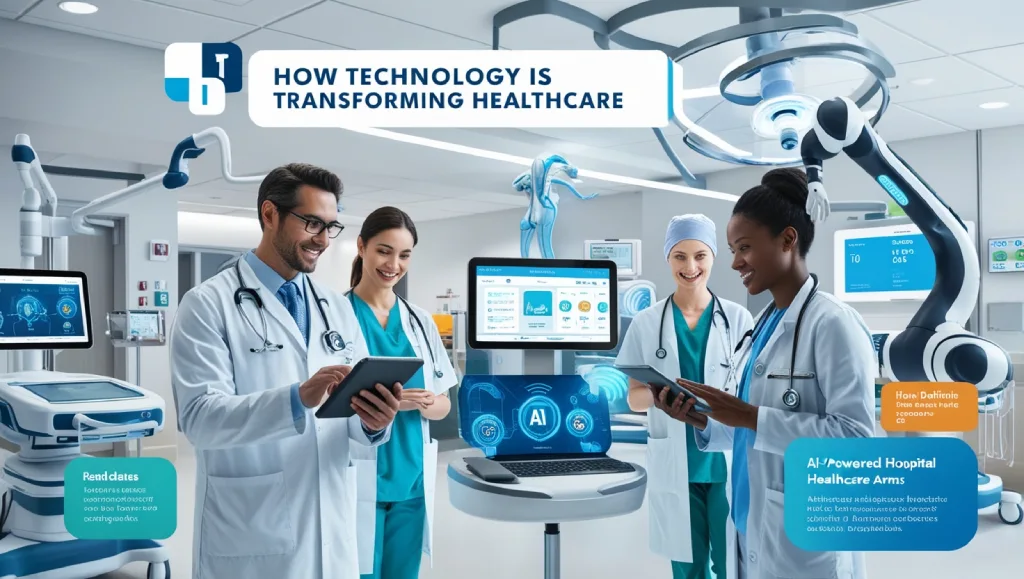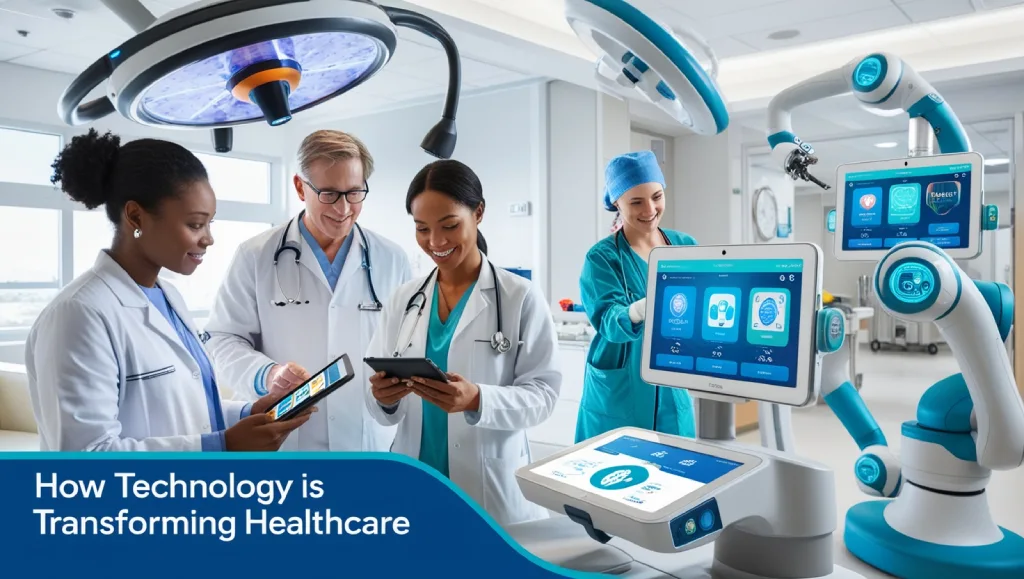How Technology Is Transforming Healthcare by advancing diagnostics, improving patient care, and reshaping the future of medicine and treatment.
In recent years, healthcare has seen groundbreaking changes thanks to technology. Today, digital innovation is playing a central role in shaping how we diagnose, treat, and prevent illnesses, while making healthcare more accessible and personalized.
Let’s dive into the world of healthcare technology, exploring everything from artificial intelligence (AI) to telemedicine, and discover the powerful ways technology is transforming healthcare to benefit both patients and professionals alike.
How Technology Is Transforming Healthcare
The intersection of technology and healthcare is constantly evolving, making treatments more effective, data more accessible, and healthcare more patient-centered.
Here’s a breakdown of the top areas where technology is transforming healthcare.
1. Enhanced Patient Diagnosis and Treatment
One of the most impactful ways technology is transforming healthcare is through enhanced patient diagnosis and treatment.
Advanced imaging, AI-assisted diagnostics, and precision medicine are among the innovations that allow healthcare providers to diagnose diseases more accurately and at an earlier stage.
How is AI Improving Diagnostic Accuracy?
Artificial intelligence (AI) algorithms analyze vast amounts of patient data to detect patterns that may not be immediately apparent to human doctors.
In fields such as radiology, AI is being used to detect anomalies in X-rays and MRIs faster and with impressive accuracy. This not only speeds up diagnosis but also helps doctors provide more accurate treatment recommendations.
2. Telemedicine and Remote Patient Monitoring

Telemedicine has become essential in recent years, offering a lifeline for patients unable to attend in-person consultations.
Through secure video calls and remote monitoring devices, telemedicine enables healthcare professionals to monitor and treat patients from afar.
The Benefits of Remote Monitoring for Chronic Conditions
For patients with chronic conditions such as diabetes or hypertension, remote monitoring provides constant access to healthcare without frequent hospital visits.
Remote monitoring tools can track vital signs, send alerts, and share data directly with healthcare providers, improving patient outcomes and reducing hospital admissions.
3. Personalized Medicine
Personalized medicine takes individual patient data to tailor treatments to each unique case, increasing the effectiveness of therapies while minimizing potential side effects.
By leveraging genetic information, lifestyle factors, and advanced data analytics, personalized medicine makes it possible to create treatments that fit each patient’s unique genetic makeup.
What Role Does Genomic Data Play?
With the advancements in genetic sequencing, doctors can now use genomic data to predict how patients will respond to certain medications. This knowledge can help prevent adverse drug reactions and enhance the overall efficacy of treatment plans.
4. Robotic Surgery and Minimally Invasive Procedures
Robotic-assisted surgery has transformed the landscape of surgical procedures, allowing for greater precision, flexibility, and control during operations.
Robotic systems like the Da Vinci Surgical System empower surgeons to perform delicate and complex surgeries with minimal incisions, reducing patient recovery time and the risk of infection.
Why Are Minimally Invasive Procedures Becoming More Popular?
Minimally invasive surgeries are associated with shorter hospital stays, less postoperative pain, and faster recovery times. For patients, this means getting back to their daily lives sooner and with fewer complications.
5. Improved Access to Health Information
Health information is now more accessible than ever, thanks to electronic health records (EHRs) and patient portals.
These platforms allow patients to access their medical histories, lab results, and treatment plans online, enabling them to be more involved in their healthcare.
How Do EHRs Benefit Patients and Providers?
EHRs streamline the sharing of information among healthcare providers, reducing errors and enhancing collaboration.
For patients, access to their own health data fosters a more informed approach to health decisions and promotes proactive self-care.
6. AI-Powered Drug Discovery
Drug discovery is a lengthy and costly process, but AI is helping to expedite it by analyzing data and predicting outcomes more efficiently.
By identifying potential drug compounds faster, AI-powered drug discovery is speeding up the development of new treatments for various diseases.
What Are the Implications of Faster Drug Discovery?
Faster drug discovery means patients can access new, effective medications sooner. This can be especially crucial for rare diseases, where treatment options are often limited.
7. Enhanced Patient Engagement and Self-Care
Mobile health apps, wearable devices, and online health communities are empowering patients to take control of their health.
These tools offer reminders, tracking capabilities, and personalized insights, encouraging patients to stay active and engaged in their care.
How Do Wearable Devices Promote Better Health?
Wearable devices like fitness trackers monitor metrics such as heart rate, steps, and sleep patterns. By tracking these daily health metrics, patients can make lifestyle changes that contribute to long-term health improvements.
8. Augmented Reality (AR) and Virtual Reality (VR) in Medical Training
AR and VR have made significant inroads in medical training, providing realistic simulations for students and professionals to practice their skills.
These immersive tools offer hands-on experience in a controlled environment, reducing the risk associated with real-life procedures.
How Are VR Simulations Used in Surgical Training?
VR simulations allow surgeons to practice complex procedures without real-life consequences, improving their skills and confidence. This not only enhances the quality of care but also prepares professionals for high-stakes situations.
9. Predictive Analytics for Better Outcomes
Predictive analytics use historical and real-time data to forecast future health outcomes. Hospitals and healthcare providers use these predictions to optimize resources, reduce costs, and prevent adverse events, ultimately improving patient care.
How Do Hospitals Benefit from Predictive Analytics?
Predictive analytics can help hospitals predict patient admission rates, allowing them to allocate staff and resources efficiently. This can be critical during flu season or pandemic situations when patient demand is high.
10. Enhanced Supply Chain and Operational Efficiency
Advanced technologies like IoT and AI are streamlining healthcare supply chains, ensuring that hospitals and clinics have the supplies they need when they need them. By improving inventory management and logistics, these technologies help reduce waste and save money.
How Does IoT Improve Supply Chain Management?
IoT devices can track medical supplies in real time, ensuring timely replenishment and preventing stockouts. This is especially important for critical items such as PPE, where availability can directly impact patient safety.
11. Blockchain for Data Security
Blockchain technology is being used to secure medical data, making it more difficult for unauthorized parties to access sensitive information.
By creating decentralized, encrypted records, blockchain ensures data integrity and boosts patient trust in the healthcare system.
Why Is Blockchain Important for Healthcare Data?
Healthcare data breaches are a significant concern, and blockchain offers a way to prevent unauthorized access. This ensures that patient information remains confidential and protected from cyber threats.
12. Mental Health and Behavioral Health Tools
Mental health is an integral part of overall well-being, and technology is making mental health care more accessible through teletherapy, AI-based mental health apps, and online support communities.
What Are the Benefits of Digital Mental Health Tools?
Digital mental health tools allow individuals to access therapy, self-help resources, and support from the comfort of their homes. This can make mental health support more accessible to people who may have difficulty accessing traditional in-person therapy.
Conclusion
As technology continues to evolve, so will its impact on healthcare. Innovations like AI, telemedicine, and robotic surgery are not just transforming how we treat diseases but also enhancing the overall patient experience.
These technologies empower patients to take charge of their health and offer healthcare providers the tools they need to provide better, more efficient care. For more in-depth insights into healthcare technology trends, visit vpnpieces.com, your trusted source of information.
FAQs
1. How does technology improve patient outcomes?
Technology allows for more accurate diagnoses, personalized treatments, and real-time monitoring, all of which contribute to better patient outcomes.
2. What are the benefits of AI in healthcare?
AI helps in diagnostics, drug discovery, and predictive analytics, improving accuracy and efficiency across various healthcare applications.
3. How is telemedicine beneficial for patients?
Telemedicine provides access to healthcare without the need for in-person visits, making healthcare more accessible for remote or immobile patients.
4. What is the role of wearable devices in healthcare?
Wearable devices help monitor patient health in real-time, providing valuable data that can inform lifestyle changes and improve long-term health outcomes.











